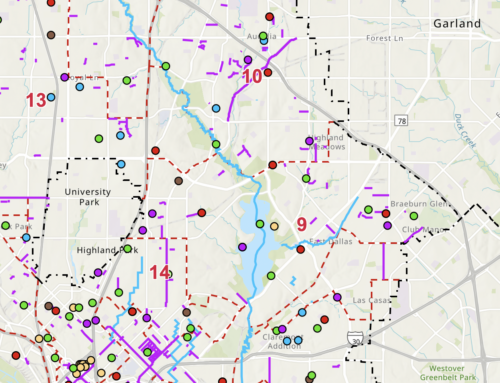City Manager John Ware’s tenure is coming to a close after about five years at the helm at City Hall. Ware is leaving the public sector for a lucrative position managing a new investment entity for Tom Hicks and others to invest in southern Dallas.
While the timing has been questioned (Hicks’ job offer came within a few months after the controversial arena vote), Ware can point to a record of accomplishments for the City. During his watch, the property tax rebounded, the line was held on tax rates, the biggest bond issue in City history passed and Downtown started making a comeback.
Nobody bats a thousand. The Housing Department was broken when Ware got here, and many think it has yet to be fixed. Large chunks of federal community development money went unspent, despite repeated citizen demands, until the story hit the front page. Code enforcement needs a major overhaul. It was also rumored that if a project didn’t enjoy the city manager’s favor, it might languish on someone’s cubicle shelf gathering a thick layer of dust.
We ought to use this opportunity to at least ponder our form of City government. Dallas is one of the few large cities in the country with a “council-manager” form of government, that is, the mayor and City Council act like a board of directors and set policy, which the city manager and employees put into action.
Many other big cities have what is called a “mayor-council” system, where the elected officials have more power and are more directly involved in City operations. Many people point to the mayor-council system as lending itself to corruption and interference in personnel decisions. However, it doesn’t have to be that way. Strong mayors like Richie Daley in Chicago and Rudy Giuliani in New York have shown that a mayor-council system can provide effective, and relatively honest, leadership.
Our council-manager system has a major design flaw that manifests itself no matter who’s in the city manager’s office. Because our system essentially calls for the mayor and council members to be part-time amateurs in a full-time professional politician’s job, what happens is that the city manager and his or her employees control the flow of information and know-how to help or hinder the policies set by the Council.
You may have heard somewhere that knowledge is power. You can also count on the fact that everyone has an agenda of some kind.
Thus, an entrenched City bureaucracy can stall or bury some things a well-meaning but less fully-engaged City Council might have asked to be done. While the city-manager system has its good points, it also often is not responsive to the people we put into office to oversee the running of the City, which in turn amounts to thwarting the will of the people.
It’s about time that we at least open up the subject of our form of City government for some healthy debate. We might ultimately keep it as it is, but we also shouldn’t assume, with Voltaire’s Doctor Pangloss, that this is the best of all possible worlds.
Jonathan Vinson, a neighborhood resident, writes a monthly opinion column about neighborhood issues. His opinions are not necessarily those of the Advocate or its management. Send comments and ideas to him at 6301 Gaston, Suite 820, Dallas 75214; FAX 214-823-8866.




